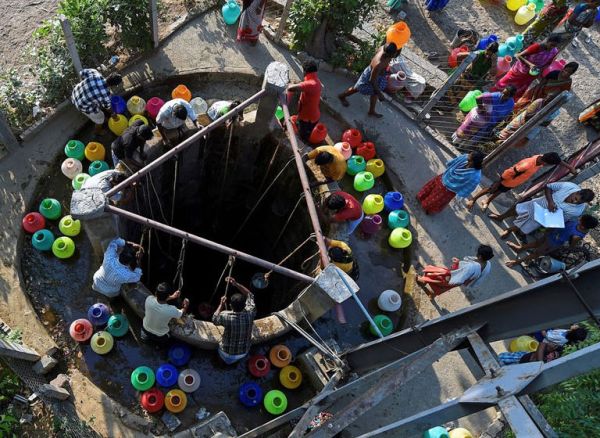
Chennai, formerly Madras, in southern India is in a severe water crisis. It has four major reservoirs, and they are almost completely dry, at a mere 0.2% of capacity. The government is distributing water via trucks and attempting to extract water from quarries. But, hmm, is water from quarries safe and is such water be purified first? Probably not. A big problem is dropping groundwater levels make it increasingly difficult to find water. Yet people there (understandably) are getting water from wells when possible, which drops groundwater levels even more. And untreated groundwater isn’t necessarily safe to drink.
It’s been hot in Chennai, the monsoons have not come this year, and glaciers are receding, so quite possibly one reason for this catastrophe is climate change. Also, urbanization means more hard surfaces and less ability for rainwater to seep into the ground and replenish groundwater.
“The destruction has just begun,” an official said. “If the rain fails us this year too, we are totally destroyed.”
Even if it does rain, it’ll be a long time until reservoirs are full again. In the meantime, how does a city of millions survive when residents are scrambling for water? And at some point this will become a public health issue.
“There is no amount of money that can buy water at the moment because there are people who are willing to spend thousands of rupees just to get a few litres of water but they are not able to get even that.
“There are a lot of restaurants that are shutting down. The malls are not functioning, public toilets and all of those things are getting affected because of the water crisis. We hope to have some rainfall super soon and get our water back.”
Punitha, a mother of two, told NDTV that she waits for hours every two days to get water from a government tanker.
She said she gets just seven pots of water on alternate days for her four-member family.
Groundwater is crucial.
Apart from the recent heatwave, depleting groundwater levels are among the reasons for the diminished supply in these areas.
According to a NITI Aayog report, Delhi is among 21 major cities that will run out of groundwater by 2020.
Scientists and experts have stressed on rainwater harvesting as being vital to recharging groundwater given that increasing number of concrete structures hinder replenishment through natural seepage.
The water recharging possibilities are higher in areas near the river because the soil there is far more permeable, in contrast to the hard rock surface found in other regions of the city.